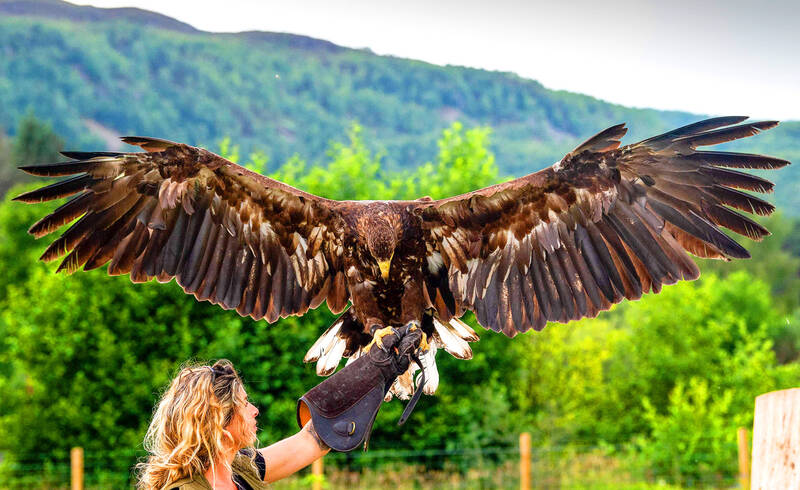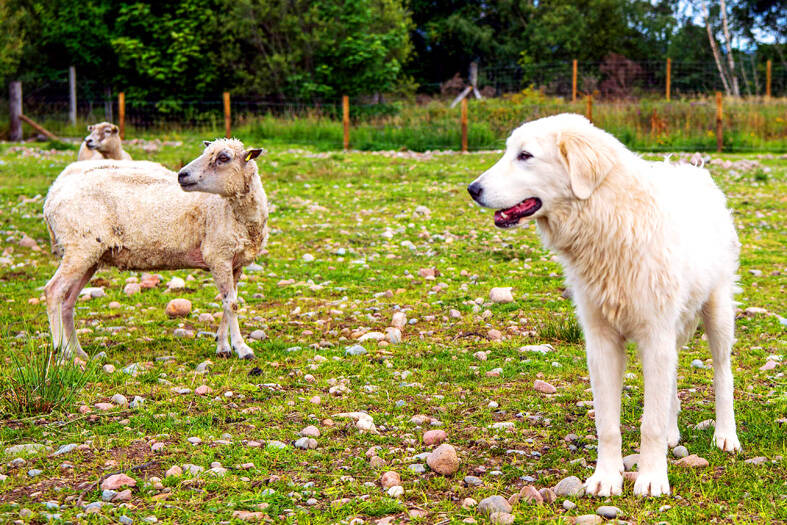Dotted among a small flock of sheep in a field in the Scottish Highlands, Luigi and Peaches, two young working dogs with thick white coats, are busy being trained to keep watch on the skies above.
The pair, who descend from the Roman-era Maremma breed reared by shepherds to protect their livestock from wolves, are learning to guard against Scotland’s resurgent sea eagles, formally known as white-tailed eagles.
Once driven to extinction across the British Isles, they have been reintroduced over the past few decades, but are increasingly blamed for ravaging lambs left to roam the countryside.

Photo: AFP
The loss of the valuable livestock is causing tensions with some farmers devastated by the financial fallout and demanding that the government issue licenses to shoot the birds. The worsening situation prompted Jonny and Daisy Ames to create the dog training program at their falconry near Aviemore, in the hope it will allow farmers and eagles to better coexist.
“The last thing that we want is to see eagles being shot, for licenses to be issued and to end up back at square one,” Daisy Ames said. “There needs to be a solution that works for both sides.”
Sea eagles were once a common sight across Scotland, but were hunted almost to extinction throughout the 19th century, with the last bird shot in 1918. A reintroduction program in 1975 brought chicks from Norway to the island of Rum, one of Scotland’s wildest places. More were reintroduced in Wester Ross between 1993 and 1998, and on the east coast in 2007 and 2012.

Photo: AFP
The birds, an endangered species with only about 10,000 pairs across the globe, have since established a breeding population on Scotland’s west coast and are now thriving — but at a cost to some farmers.
Searching for a solution, Jonny Ames tapped into his experiences working with the Cheetah Conservation Project in Namibia, where Maremmas were trained to keep the big cats away from livestock.
To teach his latest canine recruits, he attaches a lure designed to resemble an eagle to a drone and hovers it over the dogs in a sheep field.
“The drone has a big eagle hanging on the bottom of it and it kind of dive bombs the dogs a little bit,” he said. “If you can imagine an eagle in the wild, if it’s coming in to a kill and there’s a wolf there, it isn’t going to land.”
The program also involves keeping a sea eagle at the falconry to feed from a carcass in front of the dogs in a controlled environment.
“They can’t reach each other, but we want to try and show the dogs that the eagle is a predator and if there is one near the lambs then you want to scare it off,” Jonny Ames said.
One of the benefits of the dogs is that they are “completely soft” when it comes to humans, he said. “They don’t make good guard dogs for people and the worst they are going to do is lick them to death.”
Jenny Love, a sheep farmer on Scotland’s west coast, said the eagles have had a devastating effect, adding that she frequently hears complaints from local farmers.
However, she is sympathetic to the UK’s biggest bird of prey, with a majestic wingspan stretching over 2m.
“Eagles are not the bad guys here,” Love said. “There is nothing else for these birds to eat, so they are eating lambs which are easy prey for them, but this is taking an enormous toll on farmers. Their livelihood is being taken away from them. The public perception is that farmers are the bad guys.”
Farmers are eligible for a maximum annual payout of £5,000 (US$6,374) for livestock killed, through the Sea Eagle Management Scheme.
However, the process is costly and arduous, and only partially recoups the losses, Love said.
She believes compensation levels should be increased and application requirements simplified.
One farmer had lost£30,000 worth of lambs in a season, she said.
“I’ve had big tough guys breaking down in tears in front of me because they don’t know what to do,” she said.
Love is skeptical about the Maremmas, which she said are trained to work in fields where the sheep are close together.
Thousands of dogs would be needed to guard sheep across the mountains, where nearly all the lambs are lost to the birds, Love said.

Incumbent Ecuadoran President Daniel Noboa on Sunday claimed a runaway victory in the nation’s presidential election, after voters endorsed the young leader’s “iron fist” approach to rampant cartel violence. With more than 90 percent of the votes counted, the National Election Council said Noboa had an unassailable 12-point lead over his leftist rival Luisa Gonzalez. Official results showed Noboa with 56 percent of the vote, against Gonzalez’s 44 percent — a far bigger winning margin than expected after a virtual tie in the first round. Speaking to jubilant supporters in his hometown of Olon, the 37-year-old president claimed a “historic victory.” “A huge hug

Two Belgian teenagers on Tuesday were charged with wildlife piracy after they were found with thousands of ants packed in test tubes in what Kenyan authorities said was part of a trend in trafficking smaller and lesser-known species. Lornoy David and Seppe Lodewijckx, two 19-year-olds who were arrested on April 5 with 5,000 ants at a guest house, appeared distraught during their appearance before a magistrate in Nairobi and were comforted in the courtroom by relatives. They told the magistrate that they were collecting the ants for fun and did not know that it was illegal. In a separate criminal case, Kenyan Dennis

A judge in Bangladesh issued an arrest warrant for the British member of parliament and former British economic secretary to the treasury Tulip Siddiq, who is a niece of former Bangladeshi prime minister Sheikh Hasina, who was ousted in August last year in a mass uprising that ended her 15-year rule. The Bangladeshi Anti-Corruption Commission has been investigating allegations against Siddiq that she and her family members, including Hasina, illegally received land in a state-owned township project near Dhaka, the capital. Senior Special Judge of Dhaka Metropolitan Zakir Hossain passed the order on Sunday, after considering charges in three separate cases filed

APPORTIONING BLAME: The US president said that there were ‘millions of people dead because of three people’ — Vladimir Putin, Joe Biden and Volodymyr Zelenskiy US President Donald Trump on Monday resumed his attempts to blame Ukrainian President Volodymyr Zelenskiy for Russia’s invasion, falsely accusing him of responsibility for “millions” of deaths. Trump — who had a blazing public row in the Oval Office with Zelenskiy six weeks ago — said the Ukranian shared the blame with Russian President Vladimir Putin, who ordered the February 2022 invasion, and then-US president Joe Biden. Trump told reporters that there were “millions of people dead because of three people.” “Let’s say Putin No. 1, but let’s say Biden, who had no idea what the hell he was doing, No. 2, and